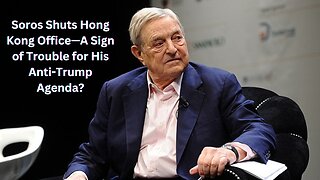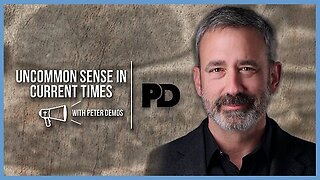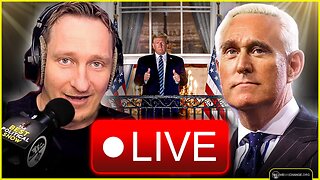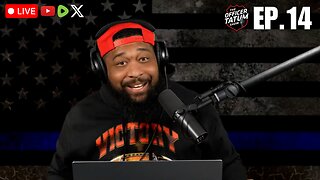Premium Only Content

Zelensky’s Anti-Church Agenda: Is Ukraine Heading Towards Religious Censorship?
Christianity is facing significant challenges under the regime of Ukrainian President Volodymyr Zelensky as the conflict with Russia escalates and impacts the country’s Orthodox Christian community. The Ukrainian parliament, the Verkhovna Rada, has passed a new law that effectively bans the Ukrainian Orthodox Church (UOC) unless it completely severs ties with the Russian Orthodox Church (ROC).
Although a definitive connection between the two Orthodox sects cannot be conclusively proven, suspicions of links between them have prompted Ukrainian authorities to take drastic measures, including the suppression of religious expression if necessary.
The legislation explicitly outlaws all ROC-affiliated establishments and religious institutions in Ukraine. It also threatens to restrict other Christian denominations unless they align with Zelensky’s anti-Russia stance.
"People are calling it the law banning the Moscow Church," said Ukrainian opposition MP Yaroslav Zheleznyak in a series of Telegram posts about the new legislation, which was approved by 265 deputies, with only 29 voting against it and four abstaining.
Set to take effect in 30 days, the law prohibits all ROC activities and its affiliates in Ukraine. The UOC has been given nine months to fully cut ties with the ROC. Zelensky argues that this ban will "reinforce Ukraine's spiritual independence."
Since Russia launched its offensive in Ukraine in February 2022, the UOC has declared its autonomy from the Moscow Patriarchate. However, Ukrainian politicians claim that UOC clergy continue to communicate with ROC clergy, leading to ongoing police raids and arrests at UOC churches and properties.
Verkhovna Rada Chairman Ruslan Stefanchuk stated that the new law will make "the Russian church in Ukraine" illegal. Zelensky welcomed this, saying the ban will "strengthen Ukraine's spiritual sovereignty."
The All-Ukrainian Council of Churches and Religious Organizations (AUCCRO), representing all Christian denominations in Ukraine, fully supports the new law, indicating that all churches under its umbrella align with Zelensky's anti-Russia agenda.
The ROC, however, claims that UOC representatives were excluded from AUCCRO discussions about the law, suggesting that this was a deliberate attempt to portray all Ukrainian Christians as anti-Russia and supportive of the legislation.
Notably, there are internal divisions within the UOC, with rival factions disputing which group truly represents the church. The two main factions are the UOC and the Kyiv-backed Orthodox Church of Ukraine (OCU), which was formed by merging two other Orthodox churches along with some UOC members.
The UOC remains the largest Orthodox church in Ukraine, with over 8,000 parishes. However, under pressure from the Zelensky government, some of these parishes have defected to the OCU.
Critics have voiced their concerns about the Zelensky regime’s efforts to control Christian expression in Ukraine. "Now we have Zionists trying to reform the Christian Church? What could possibly go wrong?" one commenter asked.
"Zelensky and his criminal gang are simply doing the work of his father, the devil," wrote another.
"Churches have the right to communicate with others," added a third. "It seems Ukraine's MPs don’t want the church to exist at all."
"This is the kind of thing Nero worried about as Rome burned around him," noted someone else.
"Hitler banned synagogues, and now Zelensky is banning Christian churches," remarked another. "The Bolsheviks also banned Russian Orthodoxy."
-
 3:33
3:33
Conspiracy Chronicle
16 days agoSoros’ Last Stand? Trump’s Comeback Puts Billionaire’s Agenda at Risk
1271 -
 1:12:43
1:12:43
Adam Does Movies
8 hours ago $6.48 earnedMoviegoers Are Singing Now! + Lilo & Stitch + Sonic 3 - LIVE!
55.8K5 -
 1:26:05
1:26:05
Donald Trump Jr.
11 hours agoRegime Media Imploding: What’s Next for MSNBC? Plus Michael Knowles & Alex Marlow | TRIGGERED Ep.194
209K200 -
 37:26
37:26
Glenn Greenwald
9 hours agoGlenn Takes Your Questions: On Trump's Cabinet, The G20 Summit, and More | SYSTEM UPDATE LOCALS SPECIAL
77.9K24 -
 2:10:20
2:10:20
We Like Shooting
16 hours ago $1.19 earnedWe Like Shooting 586 (Gun Podcast)
16K -
 52:14
52:14
Uncommon Sense In Current Times
11 hours ago $0.33 earned“Pumpkin Pie Politics: Bridging the Thanksgiving Divide to Protect The Family"
12K -
 1:01:28
1:01:28
The StoneZONE with Roger Stone
5 hours agoWhy Jack Smith Owes Americans Millions of Dollars for Fake Investigations | The StoneZONE
33.3K5 -
 3:50:40
3:50:40
Tundra Gaming Live
10 hours ago $2.27 earnedThe Worlds Okayest War Thunder Stream
33K -
 2:22:30
2:22:30
WeAreChange
8 hours agoBREAKING: Biden Admin Could SEND NUKES To Ukraine?! UK & France To Send Troops? w/ Roger Stone
49.6K16 -
 1:35:49
1:35:49
The Officer Tatum
8 hours agoLIVE: Jack Smith DROPS Case, Elon Musk BREAKS MSNBC | OT Show EP 14
82.7K78